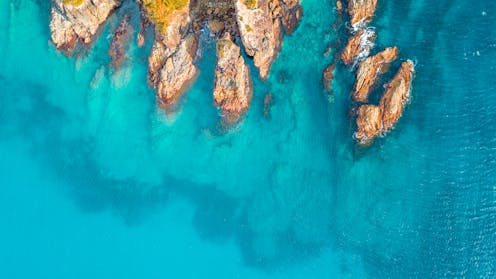NZ has a vast sea territory but lags behind other nations in protecting the ocean
- Written by Conrad Pilditch, Professor of Marine Sciences, University of Auckland, Waipapa Taumata Rau

For the past fortnight, the city of Nice in France has been the global epicentre of ocean science and politics.
Last week’s One Ocean Science Congress ended with a unanimous call for action to turn around the degradation of the ocean. And this week, the United Nation’s Ocean Conference agenda focused on better protection of marine biodiversity, sustainable fisheries and emissions cuts.
The message is clear. With only five years to the UN’s 2030 target for its sustainable development goal – to conserve the oceans, seas and marine resources – and the Global Biodiversity Framework requirement to protect 30% of the ocean, we need to make significant progress.
We all attended last week’s meeting, together with more than 2,000 marine scientists from 120 countries. Here, we reflect on New Zealand’s role and obligations to contribute to these global goals.
Legal imperatives
Globally, the ocean is warming and acidifying at accelerating rates. New Zealand’s waters are not immune to this, with more marine heatwaves which further stress our threatened marine biodiversity.
We depend directly on these ocean ecosystems to provide the air we breathe, moderate the impacts of climate change and feed millions of people.
New Zealand has significant influence on ocean policy – from Antarctica to the sub-tropical Pacific, and within its sea territory, which is 15 times the size of its landmass and spans 30 degrees of latitude.
The government is required by law to take action to secure a healthy ocean.
A recent advisory opinion from the International Tribunal on the Law of the Sea unanimously found that states, including New Zealand, have obligations under international law to reduce the impacts of climate change on marine areas, to apply an ecosystem approach to marine law and policy, reduce pollution and support the restoration of the ocean.
New Zealand courts have recognised the need to take a precautionary and ecosystem-based approach to marine management, based on science, tikanga and mātauranga Māori. These legal cases are part of a global upswell of strategic environmental and climate litigation.
If New Zealand does not comply with these marine legal obligations, it may well find itself before the courts, incurring significant legal and reputational costs.
International agreements
In 2022, New Zealand was one of 196 countries that committed to protecting at least 30% of the world’s coastal and marine areas by 2030 under the Global Biodiversity Framework. New Zealand was an enthusiastic supporter, but only 0.4% of its marine territory is fully protected in no-take marine reserves.
Former prime minister Helen Clark has criticised the current government for lagging behind on marine protection, especially in failing to ban bottom trawling.
At this week’s UN ocean summit, a further 18 countries have ratified an agreement known as the High Seas Treaty, bringing the total to 50, still short of the 60 nations needed for it to enter into force.
New Zealand signed this treaty just before the last general election, but is yet to ratify it. Foreign Minister Winston Peters represented New Zealand at the UN ocean conference, but focused mainly on issues in the Pacific.
Meanwhile, the government announced sweeping changes to the national direction on environmental policy, including reworking the New Zealand Coastal Policy Statement to better enable the use and development of the coastal environment for “priority activities” such as aquaculture, resource extraction, infrastructure and energy.
Oceanic environmental change is real and accelerating
Some countries showed that effective leadership can help navigate to a safe future for the oceans. For example, China’s commitment to clean energy has seen carbon dioxide emissions begin to fall for the first time despite higher power consumption.
At the UN ocean summit, French Polynesia’s president announced his administration would establish one of the world’s largest networks of marine protected areas.
The cost of inaction far outweighs the economics of the status quo. Ongoing ocean warming is already affecting weather patterns, with more extreme storms.
It is possible for marine ecosystems to recover quite rapidly if they are protected, at least temporarily. Yet this year, New Zealand’s government found itself in hot water (once again) with both conservationists and Māori for its management of fisheries.
We argue New Zealand has an opportunity and responsibility to demonstrate it can shift the downward spiral of oceanic degradation.
The overwhelming message at the half-way point of the UN Ocean Decade is that for marine science to transform the state of our oceans it needs to include Indigenous peoples who have routinely been sidelined from ocean policy discussions despite their longstanding rights and relationships with the ocean.
New Zealand already has a foundation of transdisciplinary and Indigenous ocean research to develop ocean policies that are fit for local purposes and to answer global calls to action. We have a unique window of opportunity to lead the changes needed.
Authors: Conrad Pilditch, Professor of Marine Sciences, University of Auckland, Waipapa Taumata Rau





